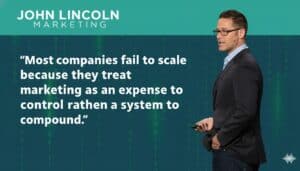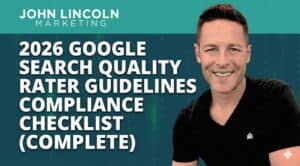
Why Compounding Growth Is the Most Undervalued Digital Marketing Strategy for Investors
Most companies in the $20 to $400 million stage are doing a lot of digital marketing, but very few feel confident that it is actually
If you are a digital marketer, you know that SEO is a constantly evolving game and if you want to be successful, you have to stay on top of the latest trends.
You also need to be sure that you’re following the rules of the algorithm if you want to get a high SERP ranking.
That’s where Your Money Your Life (YMYL) and Google EAT come in.
What does this mean and how does it affect your SEO? Let’s talk about it.
Your Money Your Life (YMYL) refers to content that contains information that, if presented inaccurately or untruthfully, could negatively impact the reader’s happiness, health, safety, or financial stability.
Google is very serious about ensuring this type of content is written by actual experts. They want to avoid promoting content that provides bad advice, misinformation, or bad information that will affect the user’s livelihood.
YMYL pages include content that falls into one or more of the following categories:
This category includes topics such as business, technology, science, or politics. Because these topics play such an important role in our day-to-day lives, it’s very important that Google is not pushing misinformation.
An example of a page that would fall into this category would include something like this:

This category includes pages covering topics such as legal issues, voting, governmental bodies, or social services.
Here is an example of a page that would fall into this category:

Content that covers topics such as taxes, 401(k)s, investment accounts, pensions, or loans would fall into this category. Any content that involves the user’s income must be accurate.
Here is an example of content regarding financial advice:

Shopping habits will always have an impact on the shopper’s life. Because of this, it is important that any content trying to push a consumer to make a sale be accurate. Examples of this type of content include researching purchases.
Here is an example of shopping information:

There can be a lot of misinformation when covering medical topics such as medications, doctors, surgeries, or hospital information. To counteract the damage that medical misinformation can do, Google tries to weed out content written by people who are not medical professionals or medical experts.
Here is an example of a site that falls into the medical advice category:

This category includes content that discusses information on people in a particular ethnic group, nationality, sexual orientation, race, or religion. Since this type of content can sometimes be a hot topic, it is important that Google only draws attention to accurate and truthful information.
An example of content that would fall into this category includes:

When writing content that falls into one of these categories, it is important to be sure that you’re following all of Google’s rules, or else it may not get properly indexed.
If your site is not properly indexed, it will negatively affect your SEO ranking or tie it to a search keyword that will land your page in front of an audience you don’t want.
If you’re a seasoned SEO pro, you’ve definitely heard of the concept of Google EAT. It stands for Expertise, Authority, and Trustworthiness.
Google rewards quality content. It’s what shows up first on SERPs. It’s the content that Google will take the time to push to its users. If you want your content to be rewarded and shown to more people, then you need to follow the EAT standards to be sure you’re creating quality and accurate content.
You should follow the EAT standards whenever you’re writing content that will be consumed by others, especially when it’s posted on the internet for a mass amount of people to read.
Since Google feels such a responsibility to eliminate misinformation, YMYL content will be judged more strictly against the EAT standards. If your content falls into a YMYL category, you should uphold the highest standards when it comes to EAT.
Expertise refers to the creator or writer of the content or page. Is this person a proven expert on this topic? Do they have the credibility necessary to back up their thoughts and opinions?
Google does sometimes consider an exception for people with “everyday expertise,” meaning that if they have specific life experience that allows them to accurately speak to the topic, they can forgo proving their education or formal training. This exception is only allowed for non-YMYL content.
Any YMYL content marketing must come from someone with proven expertise in the area.
Google puts a lot of stock into the authority that each piece of content holds. The authority in EAT refers to the creator or writer, the content itself, and the website it is published on.
They will be more likely to push content that is written by well-known people and published on well-known websites. Building your authority online is one of the biggest ways that you can help increase your ranking.
Trustworthiness refers to the creator or writer, the content, and the website. While indexing content, Google looks to see if this is a trustworthy creator. It looks to see if it was published on a trustworthy website.
If the content comes from a trustworthy author or a trustworthy website, it’s more likely that people can trust that the information contained in the content is correct.
As the number one search engine in the world, Google holds itself to a high standard. They have established themselves as a leader in the industry and work hard to monitor and filter out the content that appears on their SERPs.
This means that it holds the content that it publishes on its SERPs to a high standard as well.
Google has no tolerance for spam and has spent a lot of time building its spam detection systems. If your site is flagged as spam, it is possible that you will receive a manual action.
A manual action can do serious damage to how your page is indexed. It can also be hard to resolve.
To avoid receiving a manual action, Google recommends following these basic principles:
You can learn more about Google’s quality guidelines by visiting their information page.
YMYL and Google EAT affect your SEO page rankings more than any other aspect of SEO. If you are writing content that falls into one of the YMYL categories, the worst thing you can do is get your page flagged as spam, especially because you did something stupid in the name of SEO.
While it seems like a simple process, the best thing you can do for your page’s SEO ranking is to focus on Google EAT.
When you spend the time to organically build up your authority, gain trust, and produce quality and engaging content, your hard work will pay off.
Not only will this boost your ranking with Google but it will also establish your brand identity and boost your authority with your current and potential customers. The more people trust you, the more likely they are to buy from you and promote you and your brand to other people.
There are a lot of websites out there that promise quick SEO tips and tricks. They claim to have the answers to get you ranking in the number one spot fast.
But the truth is, the best way to improve your ranking and draw attention to your page is through good old-fashioned hard work.
Do the work. Follow the quality guidelines for YMYL. Recognize the Google EAT standards. When you do, you’ll start to see sustainable success.
YMYL stands for Your Money Your Life. It refers to content online that can have a negative effect on the consumer if it is inaccurate or untruthful.
Google EAT stands for Expertise, Authority, and Trustworthiness. It refers to the way the Google algorithm determines if your content can be trusted to be accurate or not.
Yes! It affects your SEO process in a big way. If Google determines that your site is not trustworthy, it will not produce your content on its SERP pages. If you don’t appear on the SERP pages, your traffic will suffer.
There sure is! Be sure to vet any agency or marketing consultant that you plan to hire to ensure that they understand the concepts of YMYL and EAT. They should have documented success in using both concepts for other clients or pages.
Welcome to John Lincoln’s personal website. You can learn about John Lincoln’s books, films, book him to speak and contact him. John is directly associated with many of the businesses mentioned on this website and freely discloses this information.

John Lincoln is CEO of Ignite Visibility, one of the top digital marketing agencies in the nation. Outside of Ignite Visibility, Lincoln is a frequent speaker and author of the books Advolution, Digital Influencer and The Forecaster Method. Lincoln is consistently named one of the top digital marketers in the industry and was the recipient of the coveted Search Engine Land “Search Marketer of The Year” award. Lincoln has taught digital marketing and Web Analytics at the University of California San Diego, has been named as one of San Diego’s most admired CEO’s and a top business leader under 40.
Want to get in touch with John Lincoln? Click Here To Reach Out.

Most companies in the $20 to $400 million stage are doing a lot of digital marketing, but very few feel confident that it is actually

Google Search Quality Rater Guidelines Compliance Checklist Google’s Search Quality Rater Guidelines (SQRG) are not a direct ranking algorithm, but they are the playbook human
Hey everybody, this is John Lincoln. It has been a while since I last updated this website. The last post here was on August 2,
 24 Technical SEO Issues That Are Killing Your Rankings & How to Fix Them
24 Technical SEO Issues That Are Killing Your Rankings & How to Fix Them If you’re serious about optimizing your website for search, then you need to understand technical SEO. Simply put, technical SEO is